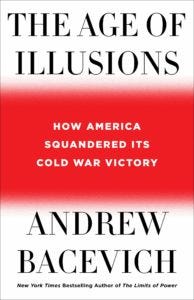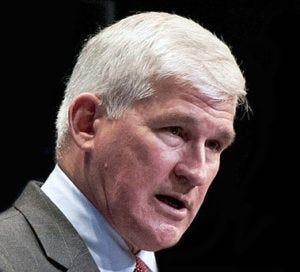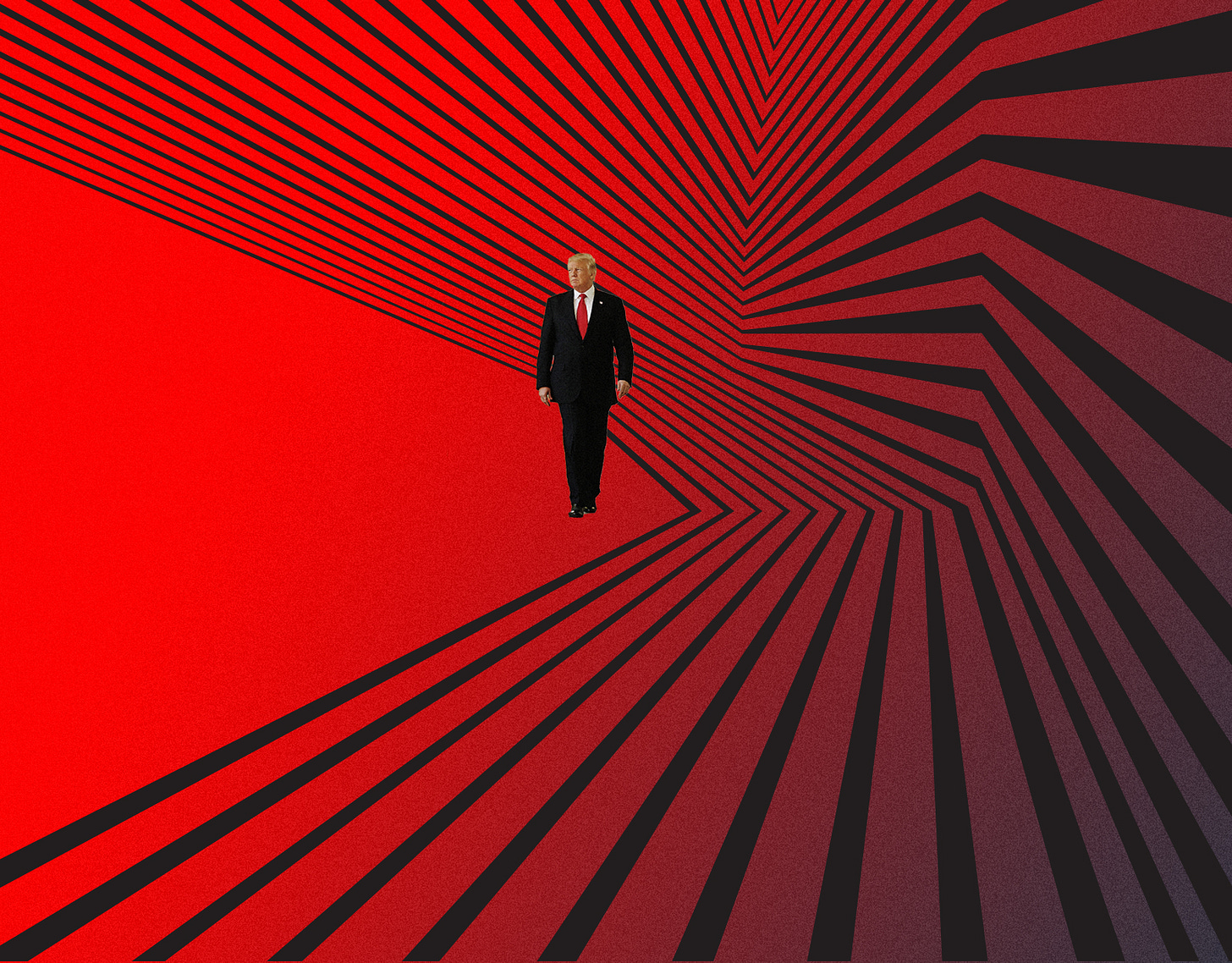America First, But without Trump
Andrew Bacevich’s blueprint for squandering our Cold War victory.
The Age of Illusions How America Squandered Its Cold War Victory by Andrew J. Bacevich Metropolitan, 236 pp., $27
Early in The Age of Illusions, Andrew Bacevich discusses the movie The Best Years of Our Lives. The 1946 classic follows the postwar lives of three World War II veterans in Boone City, a fictional working-class town. Bacevich refers to the movie and its characters repeatedly in the book, usually in an attempt to illustrate that there has been too much change in America and that it has come too fast.
As a contrast to Boone City, Bacevich offers the Emerald City of The Wizard of Oz—a gleaming vision of the future. It’s a stand-in for a dream of global trade and exchange and freedom—an unrealistic dream, in Bacevich’s telling, promoted by the likes of Francis Fukuyama and Thomas Friedman. In his telling, the dream of this Emerald City has dominated post-Cold War American foreign policy.

Bacevich, an emeritus professor of history and security studies Boston University, is a retired U.S. Army colonel who served in Vietnam and the Persian Gulf. In his articles in The American Conservative, his essays, and his books—he is quite prolific—Bacevich combines social conservatism with an opposition to American “militarism” and “interventionism”—although in this book he keeps talking about the lack of progress on social issues, including LGBT rights, and brings up how as a white male he does not stand the authority to make certain judgments. In late 2019, he became the founding president of the Quincy Institute for Responsible Statecraft, an organization dedicated to “mov[ing] U.S. foreign policy away from endless war.”
Complaining about American militarism—by which Bacevich means the U.S. investment in and use of its military as one of its several tools of global hegemony, to which he objects—is, unsurprisingly, a major theme of his new book. This is a deceitful proposition as the United States indeed relies on its military power a lot, but that reliance is far from an -ism, an ideological end to itself.
The book has another, more wistful motif: repeated comparisons between the author and Donald Trump. Bacevich regularly mentions what vices Donald Trump was engaging in at a given moment, and how Bacevich was himself at that moment doing some much more virtuous thing. Indeed, the best example of many that Bacevich cites is how Donald Trump was leading a perverted life as the author was fighting in Vietnam.
Bacevich’s obsession with Trump isn’t just because they are contemporaries (Trump was born in June 1946 and Bacevich in July 1947). Rather, Bacevich sees in Trump a populist leader, but a bad one. Bacevich expresses a fondness Ross Perot and Pat Buchanan, whose populism was “intent on salvaging what remained” of the America of Best Years. But Trump is an opportunist; he discredits populism. Bacevich seems to be implying that American political populism deserves a better hero, somebody more like himself.
Bacevich’s book is poorly researched and edited. Pages go by without a single citation. One has to ask whether Bacevich would have given a passing grade to his students for papers researched as poorly as this book has been. There are some strange errors, too. In one instance, Bacevich calls Carly Fiorina and Ben Carson the only Republican presidential candidates in 2016 who were not white males. Bobby Jindal had come up just in the previous page, and the very next paragraph is a discussion about Ted Cruz and Marco Rubio.
In his chapter on the 2016 elections, Bacevich points out some of Trump’s and Hillary Clinton’s weaknesses but acknowledges that he had signed up to be an adviser for Bernie Sanders’s campaign during that cycle. Indeed, Sanders is the only candidate who survives Bacevich’s criticisms—which is ironic, since if Sanders were elected president, he would certainly expand the power of the presidency, and Bacevich strenuously objects to the too-powerful “imperial presidency.”
Elsewhere, Bacevich blames George W. Bush for having done too little to combat racism, sexism, and homophobia, although he concedes that “little evidence exists to suggest that the forty-third president was himself overtly racist, sexist, or homophobic.” Note the grudging way he phrases that line, inserting the qualifiers “little” and “overtly.” What “little evidence” is Bacevich talking about? Does he have evidence that Bush was covertly a bigot?
This small smear is typical. Bacevich’s book is full of sweeping generalizations and significant, big-if-true factual claims supported by no evidence. For instance, in his discussion of the Iraq war, Bacevich calls Donald Rumsfeld a militarist, Dick Cheney a nationalist, and Paul Wolfowitz a missionary zealot; those are, according to Bacevich, the three legs of the stool of American exceptionalism (the subject of much of his previous writing). But Bacevich doesn’t here define any of the three terms, nor does he provide any evidence that support the assertion that those three individuals resemble whatever those terms mean.
In another passage, Bacevich claims that, for Wolfowitz, the purpose of the Afghanistan and Iraq wars was to demonstrate “the willingness, even eagerness, of the United States to remove regimes of which it disapproved.” Bacevich provides no evidence for this claim. I can say with some confidence, having studied the Iraq War with Wolfowitz during an intense week-long seminar, that demonstrating an enthusiasm for regime change was not among the top ten reasons that he favored the Iraq War.

Andrew Bacevich (Photo by Eric Dietrich / U.S. Navy)
Bacevich claims that “Iranophobes clearly hoped” that the U.S. departure from the nuclear deal would trigger a war. As the standing secretary of the Iranophobe Society, I believe that our argument has always been that appeasing Iran always leads to more aggression from Iran, and so to prevent a war, we need to punish Iran militarily. Two of our society’s members made this argument for the millionth time earlier this year.
One suspects that what Bacevich really means by “Iranophobes” is people who eat bagels for breakfast. Earlier in the book he referred to the “Israel lobby,” adopting the term popularized by John Mearsheimer and Stephen Walt’s anti-Semitic book by that name. He also complains that, “in the dispute between Israelis and Palestinians, Washington in no sense plays the role of honest broker; in matters affecting Israel, the national interests of the United States figure as an afterthought.” If only I had a penny every time I heard that Jews control the Department of State.
Some of the lacunae in Bacevich’s argument are telling. For all his criticism of globalism and “neoliberalism”—a slur against those of us who tend to believe that market economics and free trade are, on the whole, good things—Bacevich makes no mention of automation and the information revolution in industries, which are in fact the major causes of the loss of manufacturing jobs that he laments. That these factors are not mentioned even once in the book reveals how Bacevich tends to think in terms of sweeping ideologies rather than facts.
Whatever one thinks about Bacevich’s political and policy beliefs, his respect for the troops, which surely animates much of his thinking, is admirable and honorable. (Not only did Bacevich serve in the Army himself, but both his parents were WWII veterans, and his son, an Army first lieutenant, died during Operation Iraqi Freedom in 2007.) So it is no surprise that the best passage in the book is one in which Bacevich discusses the role of the military in American society. He correctly points out that our military’s enlistees are mostly working class. Bacevich puts a pessimistic spin on this fact: The military, he says, is “buying” its poor recruits with money and benefits. A better take would be that the military is the best—and perhaps the only reliable—bastion of upward mobility in our society. But Bacevich is right that our elite institutions are letting down our veterans. He points out that, in 2016, “the undergraduate student body at Princeton included exactly one veteran.” Most of our virtual-signaling corporations also do little to recruit veterans, perhaps because of the terribly inaccurate image that veterans are likely to be damaged. They are not: the overwhelming majority of our military veterans are normal Americans, with a tendency to be more disciplined and capable and less thin-skinned than lifelong civilians.
Bacevich’s book ends where it began, with complaints that American leadership tends too often to want to use military force. It is true, of course, that military power is just one tool of America’s leadership, but it is a very important and necessary tool. I have a hard time believing that Vladimir Putin is scared of America’s power of virtues.
This is the fundamental contradiction of the book. Its subtitle is “How America Squandered Its Cold War Victory.” Let’s take a step back and remember how we accomplished that victory: Accumulating wealth through innovation, free markets, and trade, keeping (and making a role model of) our government’s legitimacy through its liberalism while rejecting the very relativism moral Bacevich champions, and maintaining our military might.
Over the course of the book, Bacevich faults Americans of all kinds—from the Founding Fathers and Lincoln to modern-day politicians and voters—for their idealism and faith in America as a cause. But again, that idealism was an invaluable factor in America’s Cold War victory. It reminds one of Henry Kissinger’s quip that Iran has to decide whether it wants to be a nation or a cause. This is the fatal mistake of the “realist.” Ideological regimes seldom choose to be nations. They almost always choose to be imperial causes, be it Islamist, Communist, or, in America’s case, liberal. Bacevich is asking us to change the very foundation of what makes us a nation.
But, in a closing irony, Bacevich has his own cause he deems greater than liberalism. The book ends with three pages of discussion about climate change, which Bacevich barely mentions in the previous two hundred pages. The threat of climate change, in Bacevich’s view, is what should bring Americans together with their enemies—if you think that Republicans are unreasonable and unscientific, try Vladimir Putin! It’s a gloomy and desperate new ideology he proposes to reorder America and the world, one rooted in a Darwinian fear of survival rather than a Lockean commitment to equality and liberty. Now that hardly sounds like ‘the best years of our lives.’


